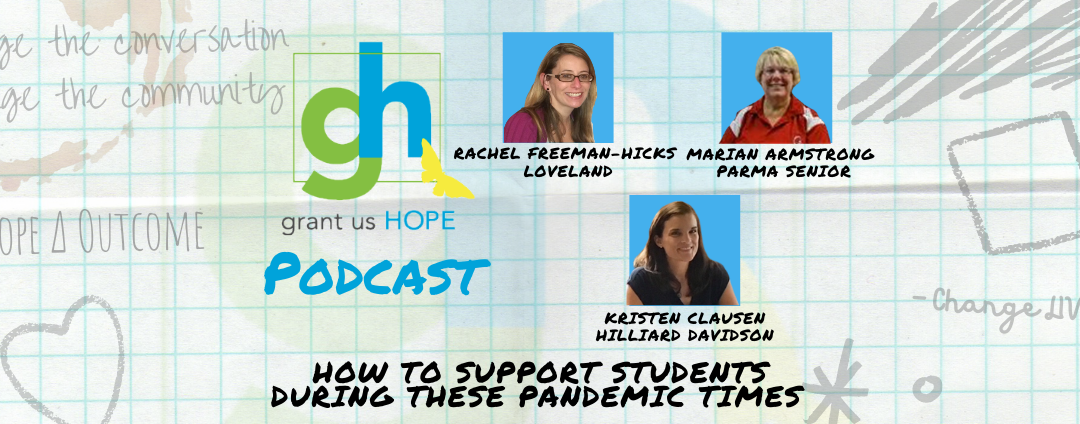In this episode, host Travis Nipper welcomes administrators from three large Ohio school districts where Hope Squads function. They share what they are seeing as students return (and sometimes return again) for in-person classes. We draw upon their years of experience for some insight and practical tips on how parents can support their students.
Listen to Episode 11
Travis begins by introducing his three guests: Marian Armstrong from Parma City Schools, Rachel Freeman-Hicks from Loveland Schools, and Kristen Clausen from Hilliard Schools (1:25)
Starting with Marian, she shares that she is a high school counselor with 34 years of experience who is passionate about meeting kids where they are at (1:36)
Kristen then shares that she is an assistant principal with 16 years in education with a passion of meeting all the needs of her students (2:15)
Rachel introduces herself by sharing that she is a school psychologist with 20 years of experience who is passionate about helping her students and about mental health and suicide prevention (3:00)
Travis sets the topic by setting a focus on the adaptation of students to online school and uncertainty and how parents can help (3:50)
Marian begins by noting that this has been a year of change with remote learning, hybrid learning, and going back and forth between these methods (4:20)
Kristen adds that they plan to stay hybrid in accordance with recommendations of Columbus officials (5:16)
Rachel continues with an outline of Loveland’s handling of their different grade levels and their hybrid implementation and how its consistency is good for students (6:10)
Rachel then responds to Travis by sharing that the little bit of normalcy that they can keep has been good for students and being able to still get them through the school doors has been positive. She adds that she’s heard from some students that they even enjoy the hybrid model despite other students having anxiety about being around other students at a time like this (8:11)
Kristen piggy backs on this point by adding that many kids are happy to at least be back in some shape or form, and that mental health issues present now can be improved with in person interaction (10:41)
Kristen then goes on to talk about how their Hope Squad and Hope Week have been integral to keeping a sense of community within the school despite obstacles they have to face that come with the pandemic (12:13)
Digging deeper into how to be proactive, Marian adds that her school’s partnership with NAMI and mental health ambassadors and how they are looking forward to the rolling out of Hope Squads next week on top of a variety of activities with their kids (14:43)
Rachel discusses how their students have been engaging in social and emotional learning and have had a constant focus on mental health and student engagement. She talks about examples like virtual recesses or a guess that tune game to be new and uplifting engagement activities (16:40)
Adding onto Travis’s point that the creativity of the kids has been a major asset during a time like this, Rachel adds that she has been very impressed with the group of students that run their Instagram account and how they have been very active in their support of their peers’ mental health (18:42)
Kristen then transitions to discuss warning signs for parents to look for as we move into the winter. Some of these warning signs may be excess sleeping, isolation, increased frustration and anger (20:01)
Marian talks about how they look for disengagement and isolation primarily and how they note what students that teachers have not seen for a week. They then follow-up by reaching out to ensure that these children are not experiencing a greater sense of loneliness (21:05)
Rachel adds that parents should monitor their child’s social media accounts to make sure they are not posting anything about feeling alone or hopeless (22:09)
Travis prompts them to further discuss this point from a parent’s perspective (23:15)
Rachel stresses the importance of creating a safe space and a trusted line of communication that their children can feel comfortable using, whether or not they want to talk to their parents (23:40)
Marian reaches out to parents by saying that they are not alone. No matter their situation she wants them to know that the school is there to help them too (25:01)
Kristen adds that building in activities can make the situation more enjoyable as well as normalizing an open dialogue about everyone’s feelings (25:42)
Concluding with our tradition of mic drops, Marian starts us off by sharing that she teaches her kids every single day to be mindful of what they are grateful for (28:28)
Rachel notes that the day of recording was World Kindness Day, and she shares the quote, “Be kind, for everyone you meet is fighting a battle you know nothing about” (29:34)
Kristen concludes with her theme of showing grace, whether it be to yourself or to each other, but help uplift each other during a time like this (30:25)
Guests:
Rachel Freeman-Hicks – Loveland Schools
Marian Armstrong – Parma City Schools
Kristen Clausen – Hilliard Schools
You can follow the podcast on Twitter at @GUHPodcast
Link to WOSU podcast we discussed in this episode.
Have a question or topic you’d like covered in an upcoming Grant Us Hope podcast? Contact us Here
Interested in learning more about how the Leadership Excelleration team can help your leaders? Contact us today.
Music:


Recent Comments